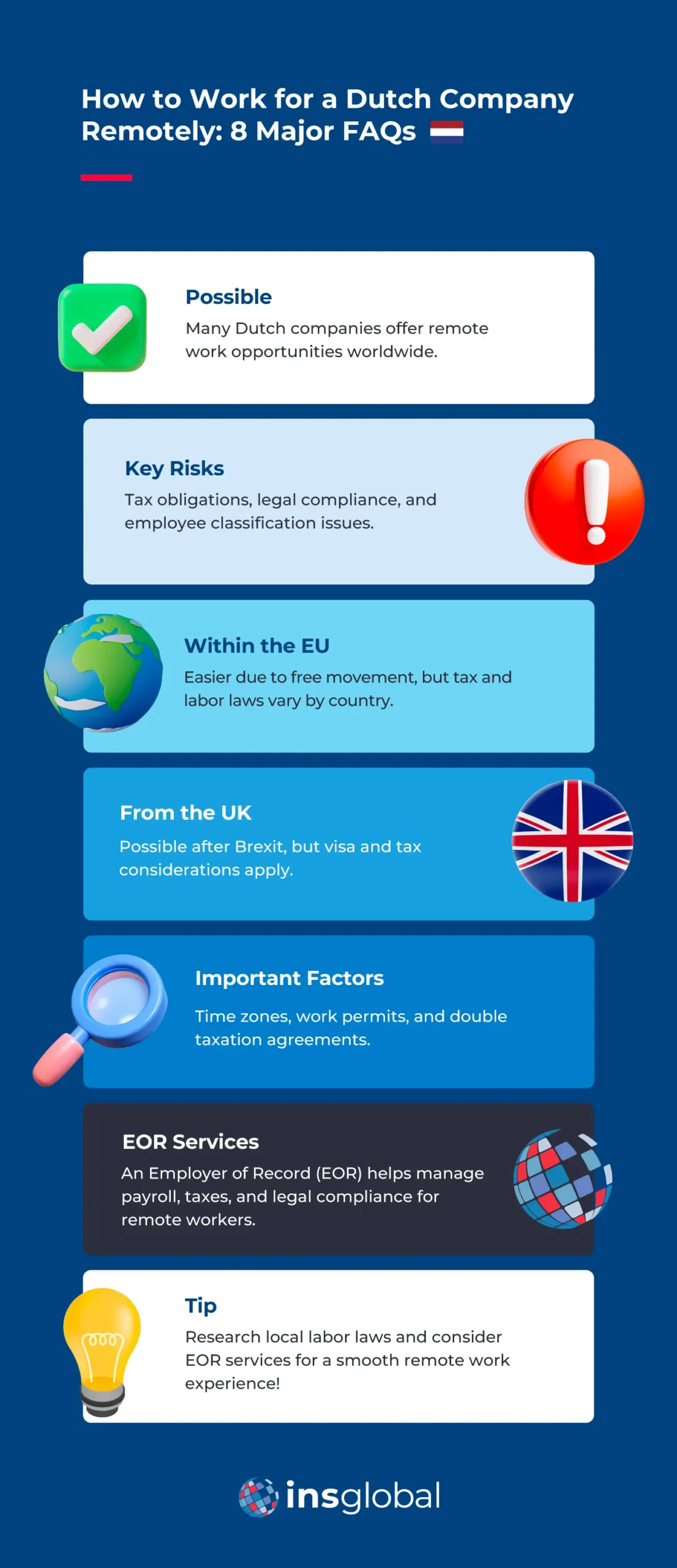Working for a Dutch company remotely is an attractive option for professionals seeking global opportunities without relocating. With the Netherlands being a hub for international business and innovation, many companies are open to remote work arrangements. However, navigating the logistics of deciding to work for a Dutch company remotely can raise questions about legal requirements, tax obligations, and cultural differences when abroad.
In this article, we answer the 8 most frequently asked questions about working remotely for a Dutch company. Whether you are looking to start working for a Dutch company or you’re a Dutch company looking to avoid the biggest difficulties that come with hiring from overseas, we cover everything you need to know to start an international remote work journey smoothly and compliantly.

Tired of scrolling? Download a PDF version for easier offline reading and sharing with coworkers
Can I Work for a Dutch Company Remotely from Anywhere in the World?
Yes, working for a Dutch company fully remotely from anywhere in the world is possible. The Netherlands is known for its progressive work policies, with many companies offering flexible and remote work arrangements. Dutch employers often seek global talent to fill work from home roles in fields like technology, finance, and creative industries.
However, it’s important to know how to navigate legal requirements when working remotely. Your employer needs to ensure compliance with both Dutch laws and the laws of your home country. Setting up a local entity to hire you can be an option, but a more efficient method may be using an Employer of Record (EOR) to manage compliance and payroll.
Can I Work for a Dutch Company from the UK?
Yes, working for a Dutch company from the UK is not only possible but also increasingly common, especially after Brexit. Despite changes in the UK’s relationship with the European Union adding complications, Dutch companies continue to hire British talent. Sectors such as tech, design, and finance are prime areas for remote work collaboration between the UK and the Netherlands.
However, the process isn’t without challenges as, after Brexit, visa and tax implications will have to be considered as part of any hiring strategy or plan. Depending on the length of employment and nature of the work, Dutch employers may need to handle visa sponsorship or ensure compliance with tax regulations to avoid penalties.
EOR services in the Netherlands can streamline this process for Dutch companies hiring UK-based workers by providing local entities to hire through and handling visa processes.
Can I Work Remotely in the EU for a Dutch Company?
Yes, remote work within the EU for a Dutch company is very common. As the Netherlands is a member of the European Union, EU citizens have the right to live and work freely across member states. Remote employees in countries like Germany, Belgium, and France frequently collaborate with Dutch companies due to the close proximity and shared time zones.
That said, each EU country has different tax and labor laws that must be respected. While Dutch labor laws are quite flexible, countries like France and Germany have strict regulations regarding employee rights. Both employers and employees should ensure compliance with local regulations to avoid legal complications.

Can I Live in Spain and Work for a Dutch Company Remotely?
Yes, living in Spain and working remotely for a Dutch company is a popular choice for professionals due to Spain’s lifestyle and favorable climate. Spain’s Digital Nomad Visa, introduced in 2023, allows remote workers to live and work in Spain legally for up to 12 months, with the option for renewal.
However, there are tax obligations and residency requirements to consider in both countries. For example, Spain’s strict tax residency laws can impact how you’re taxed, and both countries have a double taxation treaty in place to prevent paying taxes twice. Dutch companies should ensure they comply with Spanish labor laws when hiring remote workers based in Spain.
What Are the Risks of Working Remotely for a Foreign Company?
Working remotely for a foreign company, such as a Dutch one, comes with several risks, including tax law complications, compliance issues, and employee rights. Each country has its own regulations, and missteps in compliance can lead to penalties for both employer and employee.
In the case of the Netherlands, employment misclassification is a key risk. If a worker is classified as an independent contractor but functions as a full-time employee, there can be legal consequences. Moreover, double taxation is another issue, as you may be liable for taxes both in your home country and in the Netherlands. Tax treaties exist to mitigate this, and companies like INS Global can provide support to navigate these challenges.
Are There Limitations When Working Overseas for a Dutch Company?
Working overseas for a Dutch company is generally feasible, but there are limitations based on the country where you reside and the type of work you do. For example, certain industries, such as finance and healthcare, may have strict regulations regarding remote work and employee protections.
Time zones can also pose challenges. While EU-based workers will find it easier to align with Dutch business hours, workers in North America or Asia may need to adapt their schedules. Additionally, non-EU citizens must navigate visa and work permit requirements when working remotely for a Dutch company.
How Do Employer of Record (EOR) Services Work If I Want to Work for a Dutch Company Remotely?
An Employer of Record (EOR) can make working for a Dutch company remotely much simpler. EOR services take on the responsibility of being the legal employer in your home country, managing payroll, taxes, and compliance on behalf of your Dutch employer. This ensures you can receive full employment benefits and operate legally without the company needing to establish a local entity.
For Dutch companies, EOR services offer a cost-effective and efficient way to manage international remote workers. This solution is particularly useful for companies hiring across multiple countries, as it streamlines the process and mitigates legal risks.
How Much Does an EOR Cost for Remote Workers?
The cost of an EOR depends on several factors, including the country of residence, the number of employees, and the scope of services provided. For Dutch companies hiring remote workers, EOR services typically cover payroll processing, tax compliance, and benefits management. These costs are usually calculated as a percentage of the employee’s salary or on a flat fee basis.
While there’s a cost associated with EOR services, it is generally more affordable than setting up a legal entity in another country. Additionally, using an EOR ensures compliance with local employment laws, which can save companies from fines and legal troubles down the road.
How INS Global’s Employer of Record Can Help You Expand Internationally Through EOR Services
Hiring remote workers for Dutch companies can be a seamless process with the right EOR partner. INS Global provides EOR services in over 160 countries, making it easier for companies to expand their workforce without the hassle of setting up legal entities in each country.
With INS Global, both employers and employees can navigate the complexities of international remote work with ease. Our expert team handles compliance, payroll, tax filing, and more, ensuring that both the employer and employee meet all legal requirements. Whether you’re looking to work remotely for a Dutch company or expand your team globally, INS Global has the solutions you need.
Contact INS Global today to learn how we can help your business grow through compliant remote hiring.



SHARE